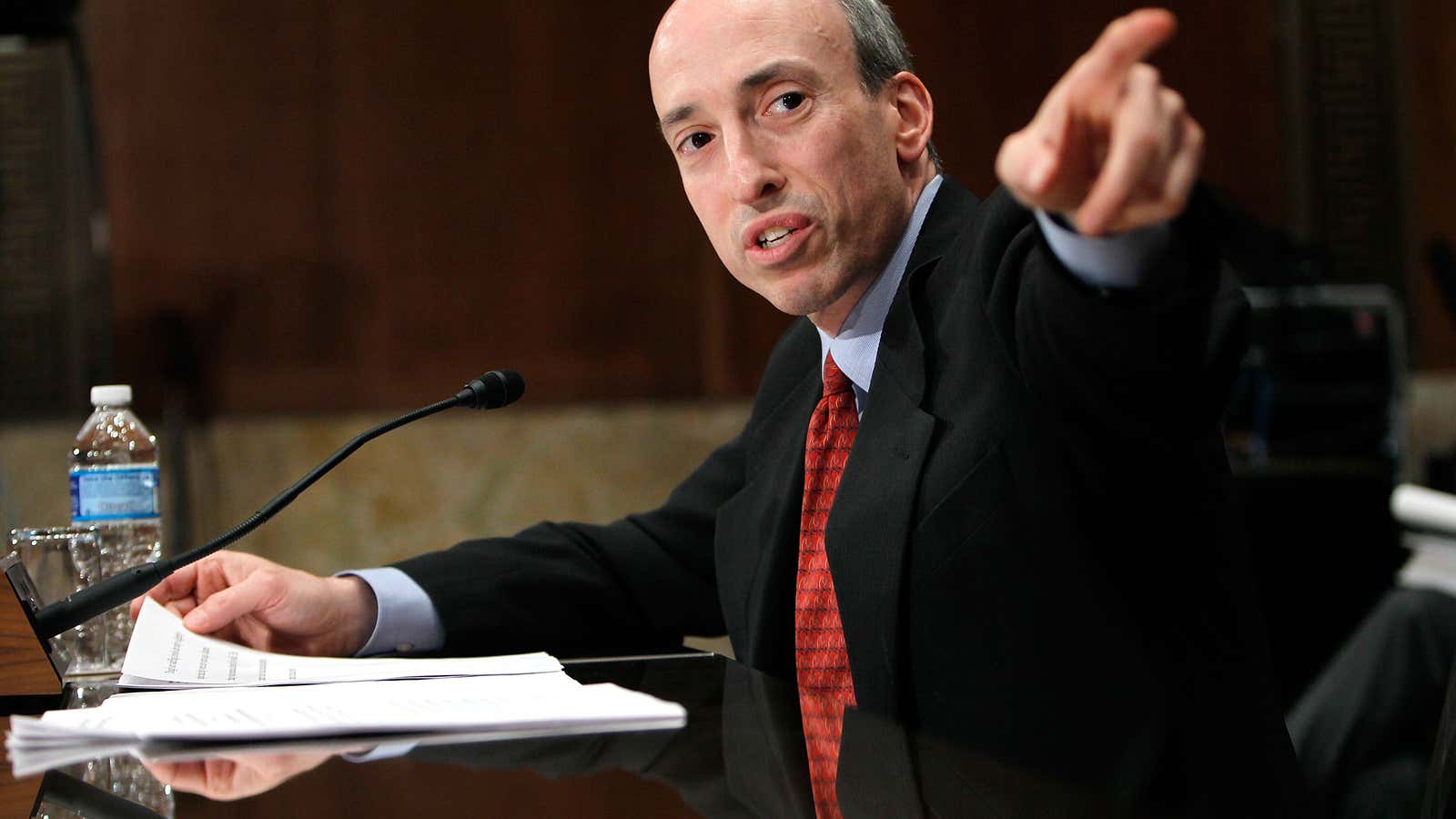There’s a legal test US regulators use to determine what qualifies as an investment contract, and therefore should be regulated by the US Securities and Exchange Commission. And the head of the SEC says most cryptocurrencies pass it.
“Of the nearly 10,000 tokens in the crypto market, I believe the vast majority are securities,” SEC chair Gary Gensler said in a Sept. 8 speech. “Offers and sales of these thousands of crypto security tokens are covered under the securities laws.”
In other words, as Gensler sees it, most of the crypto industry is operating illegally.
This is not the first time the SEC chief has argued that most cryptocurrencies pass the so-called Howey Test, which stems from a 1946 US Supreme Court case. But his latest declaration comes as crypto prices are in a bear market or “crypto winter”—and regulation appears increasingly likely.
Which regulatory regime should have authority over crypto?
In his address, Gensler called on the operators of cryptocurrencies and stablecoins—tokens pegged to another asset like the US dollar—to “get their tokens registered and regulated.” He also pointed a finger at unregistered exchanges, both centralized and decentralized ones, to come under compliance.
Crypto advocates—including some members of Congress—have pushed for any regulation to come from the US Commodity Futures Trading Commission (CFTC) rather than the SEC. Gensler, who ran the CFTC from 2009 to 2014, conceded that a minority of coins, including bitcoin, might not fully qualify as securities.
“In the case of a small number of crypto non-security tokens, they might meet some parts of the Howey Test or other tests of a security, but not necessarily all of them, and may not be securities,” Gensler said.
“Bitcoin, the first crypto token, is referred to by some as ‘digital gold’: trading like a precious metal, a speculative, scarce—yet digital—store of value,” he added, strongly implying that bitcoin specifically should be treated under commodities laws rather than the securities regime.
Not all cryptocurrencies are created equal
But immediately after suggesting bitcoin perhaps ought to be treated more like a commodity than a security, he assured the lawyers in his audience that their clients would likely not fare the same as bitcoin. Underscoring the differences, he asked:
“I have a question for the lawyers in this audience.
Do you represent any clients regarding their token projects?
How exactly were you hired? Did you enter into an engagement letter? I’m going to guess that you had a client. I’m going to guess that you did not take on the work on behalf of a dispersed, unidentified group of individuals in an ‘ecosystem.’”
The US government cracks down on crypto
The SEC has been slow in prosecuting cryptocurrencies in recent years. The commission cracked down on initial coin offerings (ICOs) in 2018, sued stablecoin operator Ripple for conducting an illegal securities offering in 2020, charged crypto lender BlockFi for failing to register its high-yield lending program, and is investigating the popular exchange Coinbase for selling unregistered securities. But it’s been far from sweeping in its enforcement actions, rather opting to pick off cases one by one.
Gensler has become accustomed to making forceful statements about his views on crypto while urging voluntary registration with the commission. In April, he said that only a few cryptocurrencies may not be securities, and he told Bloomberg in a televised interview in July that he sees “a lot of noncompliance” in the crypto industry.
Meanwhile, the rest of the US government is upping its enforcement efforts of crypto-related crimes. The Washington Post reported on Sept. 8 that the US Treasury Department is readying a series of reports urging the White House to crack down on cryptocurrencies and stablecoins. The department recently sanctioned Tornado Cash, a crypto software protocol used by North Korean hackers. And the US Justice Department recently brought insider trading charges against former employees of Coinbase and OpenSea, a major marketplace for nonfungible tokens (NFTs).
The Biden administration is signaling that it will crack down on crypto-related crimes whether or not they are illegal securities, and Gensler recently doubled the size of the SEC’s crypto assets enforcement division. But it’s still an open question, however, whether he will get more aggressive and speed up efforts to rein in an industry he sees as mostly illegal.
